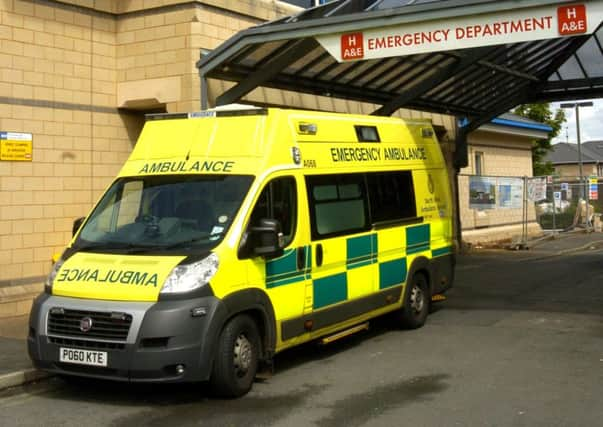'˜Extreme rise' in Lancaster A&E visits


North West Ambulance Service (NWAS) said it is also seeing an extreme rise in activity in recent months, with no signs of things slowing down.
It is the second time in two months that University Hospitals of Morecambe Bay NHS Trust (UHMBT) has issued a warning advising people only to visit A&E if they have a serious or life-threatening injury or condition.
Advertisement
Hide AdAdvertisement
Hide AdAn NWAS spokesman said the service had seen a 39 per cent rise in life threatening red calls in Lancashire compared to the same period last year.
Foluke Ajayi, chief operating officer, UHMBT, said: “We are currently experiencing increased pressure in our A&E at the RLI, and we are calling on the public to again help us.
“We do occasionally experience sudden increases in attendance which can impact on the time for patients to be seen, treated and either discharged or admitted.
“At the moment, patients are likely to experience long waiting times, whilst those who need urgent treatment are seen first.
Advertisement
Hide AdAdvertisement
Hide Ad“Please help us make sure our staff are free to treat those most in need, such as those who have a serious illness or injury.”
A North West Ambulance Service spokesperson said: “The trust has seen an extreme rise in activity in recent months and there are no signs of this slowing down at present.
“We would like to thank all of our dedicated and hardworking staff, who have worked and continue to work as hard as ever to help those in need across the whole of the north west.
“The trust received 11,004 life-threatening red calls between 20 February 2016 and 19 March 2016 in Lancashire.
Advertisement
Hide AdAdvertisement
Hide Ad“This is a significant rise in comparison to the same period the previous year, with the trust receiving 7,921 life-threatening red calls between 21 February 2015 and 21 March 2015.
“This undoubtedly means more patients are being taken to hospital which then creates high demand within emergency departments.
In busy periods, patients with non-life-threatening conditions may have to wait longer than usual for an ambulance response than we would like.”
“We would kindly urge people to think before calling for an ambulance. If you have a minor injury or illnesses it often is quicker and more convenient to use alternatives such as calling NHS 111, visiting your local pharmacist or GP walk-in centre for health advice.
Advertisement
Hide AdAdvertisement
Hide Ad“Please only call 999 for serious and life-threatening incidents and help us to keep ambulance crews free to help those most in need.”
with the Trust receiving 7,921 life-threatening red calls between 21 February 2015 and 21 March 2015. This undoubtedly means more patients are being taken to hospital which then creates high demand within emergency departments.
The public are once again being asked to consider using other healthcare services rather than Accident and Emergency (A&E), as the A&E department at the Royal Lancaster Infirmary (RLI) experiences a significant surge in demand.
If you do attend, please be patient with staff who are doing their best in difficult circumstances.
Advertisement
Hide AdAdvertisement
Hide Ad“Whilst we will see and treat all patients who attend, there are those who could be better treated elsewhere.
“We know it can be difficult when someone is unwell so if you aren’t sure whether or not to attend the A&E, please ring the NHS advice line on 111 who are trained to help.
“If you have a minor illness or injury that needs attention, you can visit your nearest pharmacist, Primary Care Assessment Centre, or speak to your GP.”
An emergency is a serious or life-threatening injury and condition, such as a suspected heart attack, acute confused state and fits that are not stopping, loss of consciousness, breathing difficulties, chest pain, head injuries or severe bleeding that cannot be stopped.
Advertisement
Hide AdAdvertisement
Hide AdIf someone is seriously ill or injured and their life is at risk, then 999 should be called.
Details of pharmacy opening times, as well as advice on caring for yourself and your family at home, are available here: http://www.nhs.uk/Pages/HomePage.aspx
or www.nhs.uk/111.
Third time this warning has gone out over the past year...January 2015, February 26 (two in a month), last April for emergency.